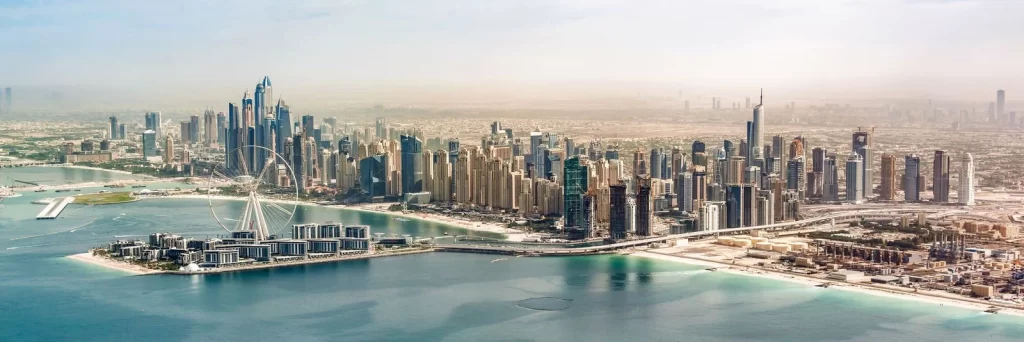Income tax in the UAE is a key reason many expats choose to live or start a business there. The country has no personal income tax, making it appealing for professionals and entrepreneurs. However, corporate tax applies to companies earning over AED 375,000 yearly. More than 6.5 million people registered for the UAE’s tax system by 2025 (MOHRE). Want to know who’s exempt and what taxes still apply? This guide breaks it down clearly.
What is income tax in the UAE?
The UAE has no income tax on salaries. Whether you’re a resident or an expat, your paycheck stays untouched.
You don’t pay tax on wages, rent, or personal income. That’s why many choose the UAE to live and work.
Since June 2023, companies making over AED 375,000 yearly must pay 9% corporate tax. Below that, they pay 0%.
So, if your business grows, you’ll need to register and file tax returns. Still, the UAE stays business-friendly and tax-light.
What Are the Main Benefits of Living in a Country Without Personal Income Tax?
Living in a country with no personal income tax offers clear financial and lifestyle benefits. Residents keep more of their earnings, while businesses gain from attracting talent and investment.
Benefits of Living Without Personal Income Tax
1. Full Paycheck Retention
- Salaries and wages are received in full. There are no hidden deductions.
2. Higher Savings Potential
- Since no personal tax applies, savings and investments grow faster.
3. Improved Lifestyle Choices
- Extra disposable income allows better housing, education, healthcare, and leisure.
4. Business and Freelancer Appeal
- Entrepreneurs and freelancers keep more profits, which supports growth.
5. Stronger Global Talent Attraction
- Countries without income tax draw professionals seeking clear pay structures.
6. Simpler Financial Planning
- No annual tax returns make budgeting predictable and stress-free.
7. Long-Term Residency Benefits
- Residents often stay longer due to stability and financial security.
8. Wealth Preservation
- With no inheritance or wealth taxes, families transfer assets without extra costs.
9. Retirement Protection
- Pensions and retirement savings remain intact, creating stronger financial security.
10. Transparency in Costs
- Indirect taxes like VAT or excise are clear, predictable, and easy to plan for.
11. Business Competitiveness
- Countries without personal income tax often attract more investment and global companies.
Tax-Free Countries Comparison Chart
| Country | Personal Tax Rate | Key Advantage | Residency Requirement |
| UAE | 0% | Business-friendly environment | 183+ days per year |
| Bahamas | 0% | Beautiful island lifestyle | Investment option |
| Monaco | 0% | Luxury European living | Proof of funds |
| Bahrain | 0% | Affordable setup costs | Property purchase |
| Cayman Islands | 0% | Premier banking hub | $2.4M investment |
Real-Life Impact
For Young Professionals
- Keep your entire starting salary
- Pay off student loans faster
- Save for your first home sooner
For Families
- Afford better international schools
- Take more family vacations
- Create lasting memories together
For Entrepreneurs
- Reinvest more profits into growth
- Attract top talent with competitive packages
- Expand your business faster
For Retirees
- Make your retirement savings last longer
- Enjoy luxury healthcare options
- Travel the world in style
Countries without personal income tax provide more than higher earnings. They create stability, encourage entrepreneurship, and support wealth preservation. With transparent systems and predictable rules, residents and investors enjoy peace of mind while building long-term financial security.
Who Is Exempt from Income Tax in the UAE?
- Individuals pay no personal income tax on salaries or wages.
- Small businesses earning up to AED 375,000 are exempt from corporate tax.
- Free zone companies meeting compliance pay zero corporate tax.
- Government entities and wholly owned public companies are exempt.
- Charities and public benefit organizations often qualify for exemption.
- Regulated investment funds and approved pension or social security funds are exempt.
- Oil, gas, and mineral extraction companies are taxed at the emirate level, exempt federally.
- Non-resident individuals generally pay no UAE income tax on foreign earnings.
- Multinational corporations with high global revenue may face a special top-up tax.
The UAE offers broad income tax exemptions supporting individuals, small businesses, specialized sectors, and strategic public entities.
Does the UAE Apply Income Tax to Individuals?
Residents, expats, and investors all ask the same thing: do individuals pay income tax in the UAE? The short answer? No.
There is no personal income tax on salaries, wages, or passive income.
The UAE is famous for its tax-friendly system. Residents and expatriates do not pay income tax on personal salaries or wages. Therefore, people enjoy higher take-home pay and greater financial freedom. Moreover, rental earnings, dividends, and savings are also tax-free.
Let’s break it down into clear points.
12 Facts You Should Know
- People working in the UAE keep their full salary without tax deductions.
- Allowances, bonuses, and commissions are also tax-free.
- Rental income, capital gains, and dividends are also tax-free.
- No one files personal tax returns in the UAE.
- Since June 2023, corporate tax at 9% applies only to business profits over AED 375,000.
- Small businesses earning below that continue to pay 0%.
- Freelancers may need to register if their income crosses the limit.
- However, individual earnings from employment stay untouched.
- The UAE does not ask for global income disclosure from its residents.
- There is no capital gains tax, no inheritance tax, and no wealth tax.
- VAT applies at 5% but only on goods and services, not your salary.
- Because of these rules, the UAE remains attractive for workers and investors.
UAE Personal and Business Tax Overview
| Tax Category | Applies to Individuals? | Rate | Notes |
| Personal Income Tax | No | 0% | Salaries, rent, and dividends are all exempt |
| Corporate Tax | No (unless self-employed) | 9% | Applies only to business profits above AED 375,000 |
| Capital Gains Tax | No | 0% | Individual investment gains are not taxed |
| Withholding Tax | No | 0% | No tax deduction from income |
| VAT | No (on income) | 5% | Applied to most goods and services only |
| Global Income Reporting | No | N/A | Residents don’t report foreign income |
The UAE’s zero-income tax system makes it easy for individuals to grow, save, and plan. While corporate rules have changed, your personal salary remains fully protected.
This clear, simple structure helps make the UAE a top global choice for work, business, and lifestyle.
Is there a corporate income tax for businesses operating in the UAE?
Yes, a new federal corporate income tax is in place. It is a tax on the net profits of a business. This law applies to financial years that began on or after June 1, 2023. It is important to know that this tax is on business profits. It is not a tax on a person’s salary. The purpose of the levy was to bring the UAE’s tax system closer to international standards.
A Clear-Cut Guide to the UAE’s Business Tax System
Wondering how the corporate tax framework operates in the United Arab Emirates? The nation has established a straightforward and business-friendly system that aligns with international norms while fueling economic growth. Let’s simplify how it all works.
Core Principles of the UAE Corporate Tax
-
Progressive Tax Tiers:
-
-
- Initially, a 0% corporate tax rate is applied to annual net profits up to AED 375,000.
- Furthermore, a standard 9% rate is levied on any taxable earnings that exceed this threshold.
- Importantly, a 15% Domestic Minimum Top-up Tax (DMTT) will be introduced in 2025 for large multinational enterprises (MNEs) meeting specific global revenue criteria.
-
-
Free Zone Advantages:
-
-
- Qualifying Free Zone entities can benefit from a 0% tax rate on approved income, provided they adhere to all regulatory conditions.
- However, this preferential rate may not be available for entities conducting business with the UAE mainland market.
-
-
Support for Small Businesses:
-
-
- Eligible small enterprises with total revenues under AED 3 million can apply for relief, which is available until the end of 2026.
- As a result, these businesses are exempt from tax payments and benefit from reduced compliance requirements.
-
-
Common Exemptions:
-
-
- Typically, government bodies, nonprofit organizations, and extractive industries (like oil and gas) are fully exempt from these tax rules.
- Likewise, dividends and capital gains derived from qualifying investments are also not subject to taxation.
-
-
Registration and Filing:
-
- All businesses must complete registration with the Federal Tax Authority (FTA) and submit yearly tax returns.
- For example, even Free Zone companies with a 0% liability are still required to file their returns annually.
UAE Corporate Tax Overview
| Aspect | Description |
| Standard Tax Rate | The standard tax rate is 9% on profits over AED 375,000 and 0% on profits under that threshold. |
| Free Zone Tax Rate | 0% on qualifying income for eligible entities. |
| DMTT for Large MNEs | 15% rate from 2025 (applies if global revenue ≥ €750M). |
| Small Business Relief | Exemption for revenue ≤ AED 3M (available until December 2026). |
| Notable Exemptions | Government entities, dividend income, and qualifying capital gains. |
The Strategic Advantage
In essence, the UAE’s tax model successfully merges local competitiveness with international transparency. Consequently, it fuels the growth of SMEs and startups through targeted incentives, while also ensuring that major global corporations contribute appropriately. Consequently, the United Arab Emirates is a leading location for international investment and corporate growth.
Finally, a solid grasp of these regulations allows companies to plan effectively and maintain full compliance. For authoritative guidance, always consult the official Federal Tax Authority website.
Need expert help?
Visit BusinessLinkUAE.com, trusted by thousands for UAE business setup and tax support.
Is there income tax on freelancers and self-employed workers in the UAE?
Freelancers and self-employed workers in the UAE are taxed only if they hold a valid business license. Under the corporate tax system introduced in 2023, income up to AED 375,000 is exempt, while earnings above this threshold face a 9% tax rate. Those without an official license are not subject to tax on their income, but operating without proper registration is not legally compliant and may result in penalties for non-compliance with UAE regulations.
Foreign Income Tax for UAE Residents: What You Should Know
UAE residents frequently inquire about whether their foreign income is subject to tax. The answer is no—but not in all cases. Whether you’re a freelancer, remote employee, or investor, you must follow some simple but important rules. Here’s what matters.
12 Points on Foreign Income for UAE Residents
- The UAE has no personal income tax on foreign or local earnings.
- You must reside in the UAE for 183 days or more to be considered a tax resident.
- Foreign income stays untaxed if it’s not tied to a UAE-based business.
- To stay out of trouble with the law, freelancers need to get a current UAE license.
- Your foreign profits could be subject to taxation in the country where you have a license.
- UAE follows a territorial tax system, so it doesn’t tax worldwide income.
- Over 140 double tax treaties (DTAs) help prevent you from being taxed twice.
- You can apply for a Tax Residency Certificate (TRC) to benefit from DTAs.
- Rental income or business profits abroad may be taxed locally.
- Foreign capital gains, dividends, and royalties are exempt in most cases.
- UAE doesn’t tax bank transfers, but other countries may review them.
- Proof of UAE residency, like a lease or DEWA bill, helps you stay compliant.
Foreign Income Tax Snapshot for UAE Residents
| Topic | UAE Treatment | Notes |
| Salary from abroad | Not taxed in the UAE | May still be taxed by your home country |
| Freelancers | Must hold a UAE license | No license means not legally registered |
| Business abroad | May be taxed overseas | Depends on the foreign country’s rules |
| Capital gains & dividends | Not taxed in the UAE | Use TRC to claim exemption abroad |
| Double Tax Treaties (DTAs) | 140+ countries signed | Helps avoid paying tax twice |
| Tax Residency | 183+ days per year in the UAE | Required to apply for TRC or DTA benefits |
| Tax Residency Certificate | Available from the UAE Ministry of Finance | Proves tax status for global compliance |
| Bank transfers | Not taxed by the UAE | May be reviewed by other countries |
| Reporting rules | None for individuals | Businesses must report UAE-sourced income |
| Inheritance & wealth tax | Not applied in the UAE | Protects global assets |
BusinesslinkUAE Advice
- UAE is tax-friendly, but other countries may claim your income.
- Always check your home country tax laws if you’re a citizen or dual resident.
- Use DTAs and TRCs to reduce tax exposure.
- Keep clean records, especially if your business or assets are overseas.
- When unsure, speak to a tax adviser familiar with cross-border rules.
Is the UAE income tax system different for expatriates and locals?
The UAE income tax system treats locals and expatriates equally. Neither group pays tax on personal salaries or wages. Both residents and expatriates only fall under taxation if they operate a business or earn profits above AED 375,000 annually. In such cases, a 9% corporate tax applies, while profits below this threshold remain exempt. There is no separate or hidden tax system for expatriates, ensuring fairness and transparency across all individuals in the UAE.
Are There Any Hidden Income Tax Charges in the UAE?
No, there are no hidden income tax charges in the UAE. Salaries and wages remain fully tax-free. However, residents may still face other clear and published taxes:
- 5% Value Added Tax (VAT): Applied to most goods and services.
- Excise Tax: Charged on items such as tobacco, sugary drinks, and energy drinks.
- Corporate Tax: From June 2023, profits above AED 375,000 are taxed at 9%.
These taxes are transparent and do not reduce your monthly salary. Employees keep their full earnings, while only businesses above the set threshold file corporate tax returns.
Is the UAE income tax system different for expatriates and locals?
No. The UAE applies the same income tax rules for locals and expatriates. Neither group pays tax on personal salaries. Both groups are only affected if they run a business or earn profits beyond AED 375,000, which then fall under corporate tax rules.
How Does the UAE Income Tax Compare with Other GCC Countries?
The UAE is known for its tax-friendly system. Yet, every GCC country follows its own approach. Comparing these systems helps residents, professionals, and investors see where the UAE stands and why it remains attractive.
Comparisons of UAE and GCC Tax Systems
- United Arab Emirates (UAE)
- No personal income tax on salaries.
- Corporate tax at 9% on profits above AED 375,000.
- Free zone firms can still enjoy 0% if compliant.
- Saudi Arabia
- No personal income tax, but 2.5% zakat applies to citizens.
- Corporate tax at 20% for foreign-owned businesses.
- VAT is higher at 15%.
- Qatar
- No tax on salaries or wages.
- Corporate tax is at 10% for most businesses.
- No VAT is currently applied.
- Kuwait
- No personal income tax.
- Foreign companies pay 15% on profits.
- Social security deductions apply to citizens, not expats.
- Bahrain
- No tax on personal income.
- Corporate tax of 46% applies only to oil and gas firms.
- VAT is set at 10%.
- Oman
- No tax on salaries or wages.
- Corporate tax at 15%, with 3% for small businesses.
- VAT applies at 5%.
UAE vs. GCC Tax Rates (2025)
| Country | Personal income tax | Corporate tax | VAT rate | Notes |
| UAE | None | 9% on profits above AED 375,000 | 5% | Free zones can stay at 0% if compliant |
| Saudi Arabia | None | 20% for foreign firms | 15% | 2.5% zakat for citizens |
| Qatar | None | 10% in most companies | 0% | VAT not applied |
| Kuwait | None | 15% on foreign businesses | 0% | Social security for nationals |
| Bahrain | None | 46% for oil and gas only | 10% | Other sectors are generally tax-free |
| Oman | None | 15% standard, 3% for small firms | 5% | Higher rates in oil and gas |
All GCC countries share one advantage—salaries remain tax-free. However, corporate tax and VAT differ widely. With 140+ double taxation agreements and strong free zone benefits, it remains one of the most attractive places for professionals, entrepreneurs, and global investors.
Why the UAE Stands Out
- Simplicity: No complex personal tax filings, unlike some GCC neighbors.
- Business-Friendly: 100% ownership and 0% tax are provided by free zones.
- Future-Proof: Early adoption of OECD rules ensures long-term stability.
While the UAE lacks personal income tax, always check corporate rules. For details, consult the Federal Tax Authority
Note: Laws evolve; verify specifics with experts.
In the UAE, how may a business register for income tax?
Registering for corporate tax in the UAE is mandatory for most companies and is handled online through the Federal Tax Authority’s EmaraTax portal. The process is simple if you prepare documents and follow each step carefully.
Steps to Register
- Access the portal: Sign up on EmaraTax or use UAE Pass for login.
- Create a business file: Enter trade license number, company type, and start/end of financial year.
- Provide company data: Include activities, legal address, and owner/shareholder information.
- Attach documents: Upload trade license, MoA, passport and Emirates ID of stakeholders, bank details, and recent accounts.
- State free zone position: Declare whether the company qualifies for special 0% rules.
- Set your financial year to match company records.
- Submit the form: After review, the FTA issues a Tax Registration Number (TRN), which must appear on all tax returns and invoices.
Documents Required
- Active trade license.
- Memorandum of Association or Articles of Association.
- IDs and passports of shareholders and authorized signatories.
- Power of Attorney (if someone with permission files on the business’s behalf).
- Contact details and bank IBAN.
- Latest financial statements.
Compliance Timeline
- Natural persons carrying taxable business must register by 31 March 2025.
- Corporate entities must apply within the deadlines announced by FTA in 2024.
- Failure to company registeration may result in penalties starting from AED 10,000.
- All financial records should be kept on file for a minimum of five years.
Why It Matters
Timely registration ensures full compliance and avoids penalties. The UAE’s corporate tax system is still light compared with global standards: 0% tax on profits up to AED 375,000 and 9% on income above this threshold, with qualifying free zone firms keeping preferential treatment.
UAE Corporate Tax: Late Filing and Registration Penalties
Failing to register or file corporate tax correctly in the UAE can lead to serious financial penalties. While the process is simple, missing deadlines or ignoring compliance rules comes at a cost. Below is a clear breakdown of common penalties every business must know.
UAE Corporate Tax Penalties: What Every Business Must Know
1. Missed Registration
- AED 10,000 fine applies if you fail to register. However, if you file your return within 7 months of the first tax period, the fine may be waived.
2. Late Filing of Returns
- AED 500 will be the monthly payment for the first 12 months. AED 1,000 every month after that, and then AED 20,000.
3. Delayed Payment of Tax
- Unpaid taxes are subject to an annual interest rate of 14%.
- It starts from the due date and grows monthly.
4. Incorrect or Incomplete Return
- The penalty for tax return errors is AED 500. But if you fix it before the deadline, the fine is usually cancelled.
5. Missing or Poor Records
- AED 10,000 for not keeping tax records. If repeated within 24 months, the penalty rises to AED 20,000.
6. Refusing Audit or FTA Checks
- AED 20,000 if your business does not assist during audits.
UAE Corporate Tax Penalties Table
| Violation Type | Penalty | Notes |
| Late registration | AED 10,000 | Fine may be waived if the first return is filed within 7 months |
| Late tax return filing | AED 500/month (first year) | Increases to AED 1,000/month after 12 months |
| Late payment of tax | 14% annual interest | Interest is charged monthly on the unpaid balance |
| Incorrect tax return | AED 500 | Cancelled if corrected before the filing deadline |
| Record-keeping violation | AED 10,000–20,000 | Fine doubles if repeated within 24 months |
| Audit non-compliance | AED 20,000 | Applies if a business does not cooperate with FTA checks |
Although there’s no income tax on salaries in the UAE, corporate rules are strict. Penalties are clear and costly. Therefore, register early, file on time, and check every detail. By doing this, your company remains stress-free, safe, and compliant.
What is the difference between personal income tax and other taxes, like VAT, in the UAE?
The UAE has no personal income tax, so your salary isn’t taxed. But you still pay other taxes. VAT, a 5% tax applied to the majority of goods and services, is the most prevalent. It’s indirect, meaning it’s included in what you pay. You may also face excise taxes on tobacco and sugary drinks. Some emirates charge local municipal fees, too. While income stays tax-free, daily spending can include several types of indirect taxes.
What Should You Know Before Moving to the UAE About Income Tax?
If you plan to live or work in the UAE, you should know a few key points:
- You will not pay personal income tax on your salary.
- You may pay VAT or excise taxes when buying goods and services.
- If you run a licensed business, corporate income tax may apply above AED 375,000 profit.
- Double tax treaties protect you if you earn income abroad.
This system is clear, predictable, and supports financial planning. It attracts professionals, investors, and entrepreneurs to the UAE.
Summary
The UAE continues to stand out with zero personal income tax, giving residents full control of their earnings. Yet, corporate rules are strict, and missing registration or filing deadlines can lead to heavy penalties.
Stay Compliant with Ease – Business Link Has You Covered
The good news is that compliance is simple when you act early and keep your records clean. Business Link is here to help with company registration, tax compliance, and ongoing support. Contact Business Link for bsuiness setup in dubai today and secure your business future with confidence.
Contact our team today by phone at +97143215227, WhatsApp at +971502052735, or email at connect@businesslinkuae.com to receive clear answers, expert advice, and hands-on assistance. This will enable you to attend your appointment fully prepared and confident.
FAQ’s
How does the new UAE corporate income tax law work for small businesses?
The law works very well for small businesses. That is because the tax rate is structured in tiers. For example, the tax rate is 0% on all taxable income up to AED 375,000. Any income above that amount is taxed at a rate of 9%. Therefore, a small business with profits under the AED 375,000 limit does not pay any corporate tax. Individuals who run a business or have a commercial license may also be subject to this tax.
Do free zone companies have to pay a business income tax?
Some free zone companies can pay a 0% corporate income tax. This is a special benefit for these areas. The goal is to bring in foreign money and business. A company in a free zone can get the 0% rate if it meets certain conditions. The company must have enough presence in the UAE. It also needs to have what is called Qualifying Income. If it does not meet these rules, it may have to pay the standard 9% tax rate.
How do other countries’ tax rules affect my personal income tax if I live in the UAE?
Other countries’ tax rules may still impact your income even if you live in the UAE. The UAE does not impose personal income tax, but nations like the United States require citizens to report worldwide earnings regardless of residency. Since no tax treaty exists between the UAE and the US, Americans must comply with IRS rules. However, tools such as the Foreign Earned Income Exclusion can reduce overall tax liability for eligible individuals.
Do UAE residents pay income tax on salaries?
No, they don’t pay income tax on their salaries. This applies to both nationals and expatriates.







